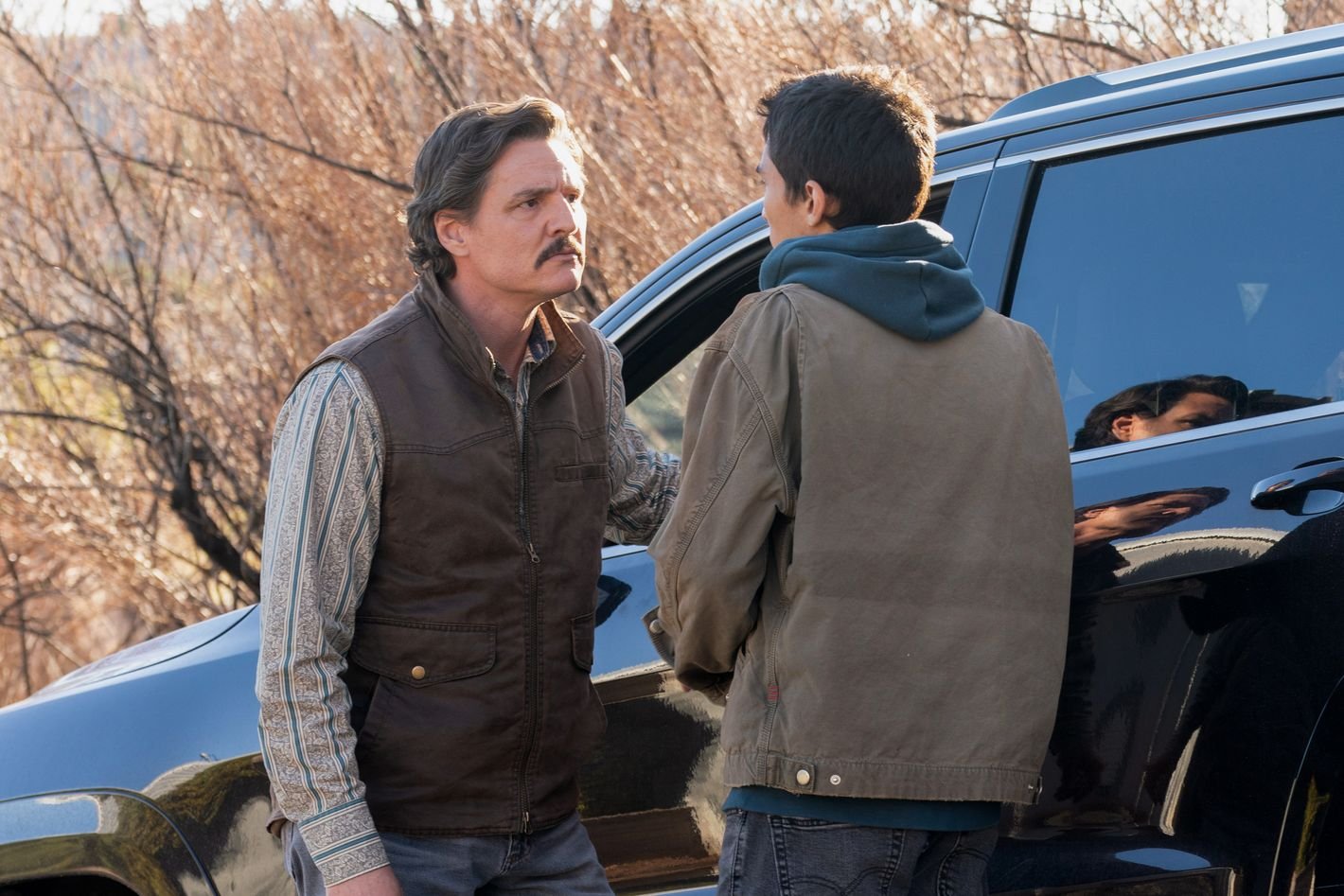Photo: Richard Foreman/A24
This post contains major plot spoilers for Eddington.
One of the best gags in the teaser trailer for Eddington was the quick shot of a teenager doing a TikTok dance with the caption “When you finished reading James Baldwin’s Giovanni’s Room.” The teenager in question is Sarah (Amélie Hoeferle) — or @sarah_bernieorbuuust on Instagram — one of Eddington’s socially conscious teens. In fact, Sarah is the socially conscious teen, or at least the hottest in the small New Mexico town. Her fellow students Eric (Matt Gomez Hidaka) and Brian (Cameron Mann) compete for her attention with surface-level critiques of police violence and white privilege, mostly hoping to get laid. The year 2020 was a strange time, Eddington reminds the viewer every 90 or so seconds, when a public, online performance of politics became a normal way of communicating.
Writer and director Ari Aster takes shots (literal and figurative) at everyone in Eddington, but the film’s chronically online teenagers are frequently the butt of his jokes. As the most generalized version of a Gen-Zer, the main teen trio lead a local leftist movement incensed by the killing of George Floyd and the ongoing lack of accountability for police violence. On a dark night, we meet Eric and Brian, unsupervised and horny, smoking weed and avoiding town sheriff Joe Cross (Joaquin Phoenix). He has little patience for them, but they’re not afraid of him at all. Their aimless biking around and goofing off are two of many signs that the social order of Eddington is crumbling under the weight of COVID restrictions. Blessed and cursed with ample free time, Eric and Brian turn their attention to Sarah and try to “out-woke” each other, posting and reading (or skimming) and attempting to assert their newfound sense of social justice so that something in Eddington can change, even if it’s just Sarah dating one of them. Aster wants us to laugh at these guys; they’re pretty pathetic. Mann plays Brian with a frazzled sense of desperation and self-assertion: It’s his idea to go talk to Sarah at a social-distance party, but he gets overlooked for Eric every time. Brian doesn’t understand, perhaps because his brain is not fully formed, that being socially aware is not really about being the best at it. Gomez Hidaka, as Eric, opts instead for a brazen confidence. Like his dad, Mayor Ted Garcia (Pedro Pascal), Eric is smug and kind of a fucker. Sarah, to her credit, seems to know the value of getting close to a local politician’s son; she’s not immune to the power she’s keen to dismantle. It’s a cynical take on a watershed moment, but resistance grifters predate the abnormality of 2020.
That the teens represent a spectrum of social awareness keeps Eddington from devolving into a “kids these days” mentality. Aster understands that people are radicalized for all different reasons: Some are altruistic, but mostly it’s out of a selfish desire to fit in or to troll others. Brian’s attempts to impress Sarah are motivated by his libido, but his efforts transform into a desperate panic as the town devolves into chaos. We’re meant to see Sarah, who at one point berates her ex-boyfriend and Eddington’s one Black cop, Michael (Micheal Ward), for participating in a system that oppresses him, as hysterical and self-serving. What does this little blonde girl know about anything? But for all that Aster shows us, Sarah does seem to be acting in relative earnestness. That she’s not quite self-aware or mature enough to realize a movement doesn’t surround her is only a sign of her age rather than intent.
In a town fighting for its right for survival, no one seems to care much at all about the younger generation’s future. There is a small sense of tragedy when Joe’s bullet rips through the glass screen door and into Eric — a kid, still, even if kind of a dumbass one. These teens have few, if any, adults to look up to. For all that Ted purports to be the town’s neoliberal savior, we rarely — if at all — see him show any affection toward his son. In the absence of Eric’s mother, the relationship between Ted and Eric has festered into a staid resentment. Ted’s strained relationship with his son mirrors Ted’s relationship to the whole of Eddington, a town he’s supposed to take care of. Both have the potential to bolster or ruin his reputation, but that’s as far as his caring goes. In the drifting sands of Eddington’s landscape, the teens come to realize that the adults in town don’t know any better than they do and act out. They spin out; they talk back. They find themselves just as stupid and useless as the people who boss them around. They are brats, but their naïveté and optimism and the swiftness with which they turn away from it all still stings; there were many who thought we might emerge from that time in history as better or more aware or accountable for our actions. Haha, Eddington says. Joke’s on you.
Despite punching left at our teens, Aster is clear to show that those who seek social justice only through who they want to fuck are not as foolish or even as harmful as, say, the sheriff who murders the mayor’s son in cold blood. If nothing else, what Aster argues is that there are people on both sides of the political aisle who are motivated by self-preservation — when push comes to shove, most act in their own interest. After Brian later saves Joe’s life in the climax of the film, while recording on his phone, he becomes a Kyle Rittenhouse–esque right-wing influencer in Gainesville, Florida. His filmed act of violence is the movie’s sour punch line and its inevitable tragedy.
Related
Ari Aster’s Eddington Is Bracingly Nasty and Unsure of What It’s Trying to SaySo What Really Was the Conspiracy in Eddington?Ari Aster Explains the ‘Very Strong Politics’ of Eddington

